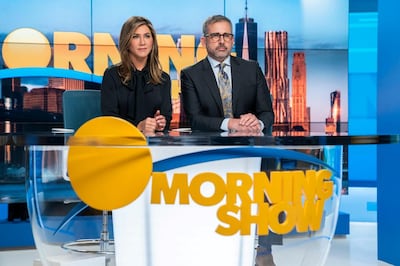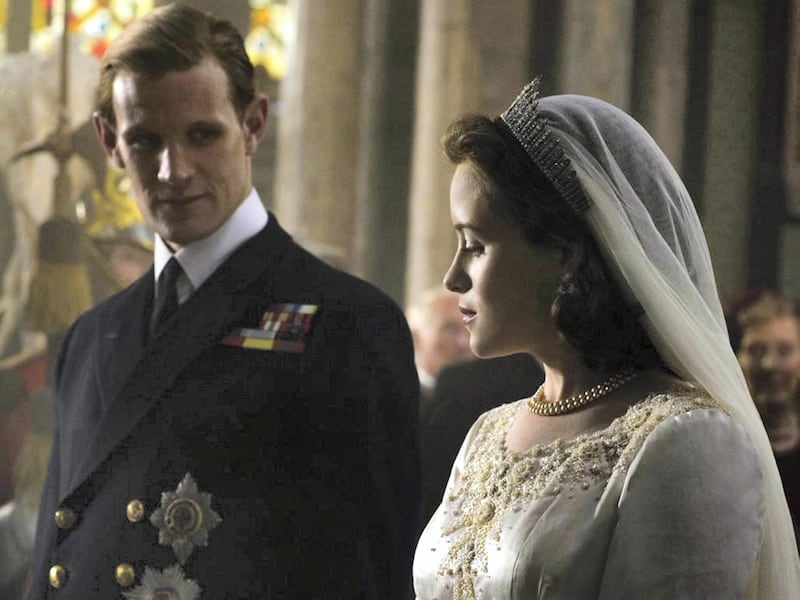In a moment of supreme irony, the Golden Globes ceremony on Sunday, January 5, will be screened live by NBC and the results reported breathlessly by the rest of broadcast television. For the coverage of the Hollywood fandango will amount to a highlights reel for the current generation of streaming companies, the same ones that are leaving those broadcast networks in the dust.
Netflix has 34 Golden Globe nominations in film and television, while the "Big Three" American networks – ABC, NBC and CBS – managed not one between them. But the battle is not simply between the networks and the streamers. There is a form of civil war within the latter.
Succession, the hit HBO drama that follows the fluctuating fortunes of mythical media conglomerate Waystar Royco, is nominated for three Golden Globes. HBO has 15 nominations in total and its owner, WarnerMedia, will launch an HBO Max subscription video-on-demand service in May, challenging Netflix and the other existing combatants in the "streaming wars" that are redefining our visual entertainment.

Yet while Netflix has achieved first mover advantage in the entertainment battle, it has come at a cost. Its annual spending budget has risen to $15 billion (Dh55bn) as it seeks to hold off competitors by offering bigger and better original content.
The streaming company's catalogue has grown to 50,000 TV episodes and 4,000 movies. Its royal drama The Crown costs $13 million a show to make. Its new movie The Irishman, which used sophisticated technology to de-age some of its all-star cast, came in at $170m (but was watched by 26m subscribers in a week). It also makes local content, including the Arabic-language series Jinn.
There is no guarantee that this relentlessly ambitious content strategy will succeed. While Netflix leads the way with 160m global subscribers, its financial future is uncertain. With a debt pile standing at more than $12bn, its share price growth has slowed this year. Both Amazon Prime, which is second in the market, and Hulu are chipping away at Netflix's streaming dominance in America. Analysts predict Netflix will lose four million American subscribers in 2020 and have to lower its prices in the face of increased competition.

In November, Apple launched its Apple TV+ service at $4.99 a month. It has an annual budget of $6bn for content, which includes The Morning Show, starring Reese Witherspoon and Jennifer Aniston and costing $150m per season to make. The same month, The Walt Disney Co debuted its Disney+ service, offering the Marvel, Pixar and Lucasfilm Star Wars catalogues plus new original shows. All for $6.99 a month. Netflix, which charges $9 to $16 a month for its premium packages, is in danger of looking over-priced.
Regional public broadcasters are struggling to compete with this Californian onslaught. Scandinavian TV groups are diverting budget towards the production of home-grown shows to fight off Netflix. In November, British public broadcasters launched the subscription service BritBox in the UK (it already had 650,000 subscribers in North America). Its chances of success are hampered by much of the content being available for free on existing streaming platforms.
During 2020, audiences will begin to divide into two camps: those wealthy enough to pay for several subscriptions, and those happy to watch free-access, advertising-funded streamed content. Deloitte predicts a boom in these free services, such as Viacom's Pluto TV, which is being rolled out in Europe and has 20 million viewers in the US, half of them aged 18 to 34. It is being reported that the NBC-owner Comcast is considering an ad-funded and free access model for Peacock, the streaming service it will launch in 2020. Even then it will need high-quality content. Comcast recently announced that its European subsidiary Sky will build a Hollywood-style studio complex over 32 acres outside London.

This monumental spending spree amounts to a golden age for actors, directors and all the other producers of what we used to call “television”. It should also be a grand time for us consumers. Certainly we have never had so much choice.
But many believe that the streaming wars are unsustainable. "The supply of content is going up and up and up in response to a demand that is huge, but really poorly understood and a funding model that is failing to deliver," says Mark Harrison, managing director of the Digital Production Partnership, a UK media industry business network of 400 companies. "There will be a point at which something bursts. The question is what provokes that, and what comes next."
This year will be the 500th anniversary of the infamous South Sea Bubble, when feverish investment in perceived intercontinental trading opportunities led many to financial ruin. A more salient warning for the media businesses fighting the streaming wars might be the dot-com crash of 20 years ago, when venture capital money first poured into tech stocks.
Looking back to those times (before the days of YouTube or mobile video) there was little indication of how television would evolve into the hyper-personalised and on-demand experience we expect today. Consumer behaviour has changed and there is no going back.
The streaming wars will be bloody, but the media giants, some of which may not survive, have no choice but to engage. It's not hard to see why Rupert Murdoch (the most obvious inspiration for Succession character Logan Roy, boss of Waystar Royco) cut his losses and sold 21st Century Fox to Disney for $71.3bn in March 2019.
To survive, many streaming services will have to merge or sell-up to create the kind of comprehensive content catalogues and first-class user experiences that consumers have come to expect when streaming music and podcasts. That could mean an outbreak of dealmaking and buy-outs that a younger Murdoch would have relished.
Streaming wars will be a real-life drama as gripping as any box set imagined so far. And you don't need to pay a monthly subscription to follow it.











